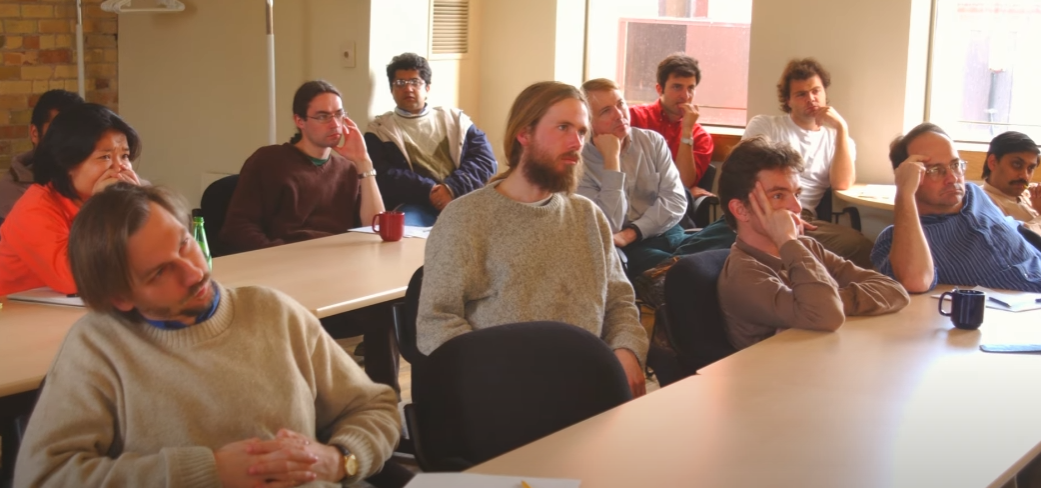Laurent Freidel did not plan on becoming a theoretical physicist.
He wanted to be a writer. And a globe-trotting mountain climber. And a jazz musician.
It turned out, to his happy surprise, that theoretical physics provided him with the same joys and challenges as those pastimes, and a lot more.
“There’s something peaceful and honest about mathematics,” he says. “It’s hard, but in a very simplistic way — it’s a space where I could find clarity.”
That sense of clarity led Freidel to a PhD at L’École Normale Supérieure de Lyon and a position with France’s prestigious CNRS research centre in the 1990s. He visited Perimeter Institute in its first year and was so impressed by its ambition and audacity that he joined the Institute as a faculty member shortly thereafter.
“When I first came to Perimeter, it was like a utopia for physics,” recalls Freidel, nearly 25 years later.
“It was an adventurous place, full of energy and ideas. There were no permanent positions, no orthodoxy — just a sense of building something new.”
Freidel joined Perimeter because he saw it as a place where he and colleagues could make serious progress in quantum gravity, a field that was not as widely recognized or supported then as it is today. As Perimeter kept recruiting ambitious, early-career scientists from around the world, Freidel collaborated across disciplines with experts in quantum information and quantum foundations.
“It was a unique place, very adventurous, with lots of new ideas and a special kind of energy,” Freidel recalls of those first days, when Perimeter was housed in a former post office in Waterloo, ON. “To be part of building this institute in the early years was quite something – it was an adventure.”
Being immersed in that community, and helping it grow over two decades, has allowed Freidel to make significant and sometimes-unexpected progress in decoding a fundamental puzzle in physics. He is a namesake of the Freidel-Krasnov model, which uses “spin foam” to describe spacetime as a web of interconnected quantum states.
“At its heart, quantum gravity is the unification of two fundamental concepts,” he explains. “One comes from the building blocks of the universe, and the other from the totality of the universe. The goal is to find a synthesis – a duality between the two.”
Finding that synthesis is much easier said than done; finding a unified theory of everything is arguably the biggest open question in science, and physicists are tackling it from many angles.
Freidel’s current toolkit for cracking the challenge of quantum gravity is a framework called local holography, which builds on the concept of symmetry. Physicists describe symmetry as a kind of order – a property that remains unchanged under various transformations.
Freidel employs symmetry as a bridge between the macro and micro worlds, carving spacetime into local systems and exploring how they connect. Ultimately, research like Freidel’s - under the banner of what physicists call ‘holography’ - aims to understand quantum gravity by reducing the problem’s complexity.
The puzzles of quantum gravity are incredibly tricky, and most attempts to answer them fail before they succeed. For Freidel, this is part of the joy.
“Failures teach you humility,” he says. “They stretch your mind and force you to ask better questions. Sometimes you have to go back to being a beginner, and that’s where the real power of understanding comes. Being a theoretical physicist means you’re an adventurer, a philosopher, a mathematician, a writer, a computer scientist – it’s the job of assembling all these facets into something meaningful.”
Freidel says he can’t imagine a better place than Perimeter to have spent most of his career in theoretical physics; he’s excited to see where the story leads next.
“This place has kept its spirit of adventure,” he says. “For what I do, it’s one of the best places on the planet. I care deeply about its future and its success.”
About PI
Perimeter Institute is the world’s largest research hub devoted to theoretical physics. The independent Institute was founded in 1999 to foster breakthroughs in the fundamental understanding of our universe, from the smallest particles to the entire cosmos. Research at Perimeter is motivated by the understanding that fundamental science advances human knowledge and catalyzes innovation, and that today’s theoretical physics is tomorrow’s technology. Located in the Region of Waterloo, the not-for-profit Institute is a unique public-private endeavour, including the Governments of Ontario and Canada, that enables cutting-edge research, trains the next generation of scientific pioneers, and shares the power of physics through award-winning educational outreach and public engagement.
You might be interested in





